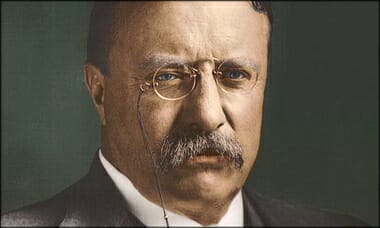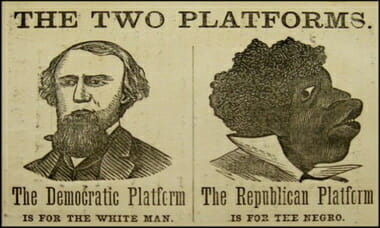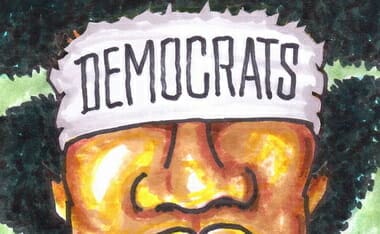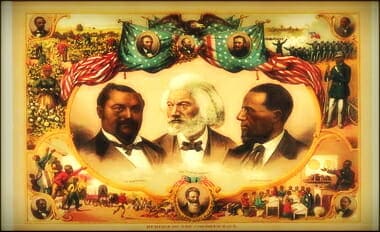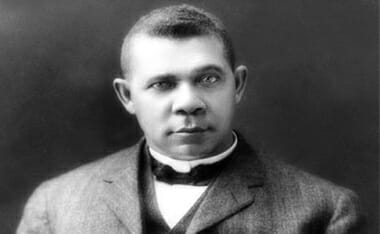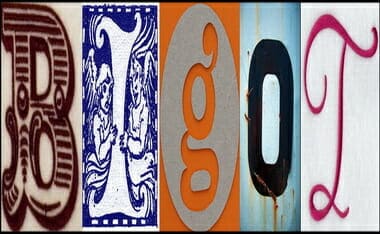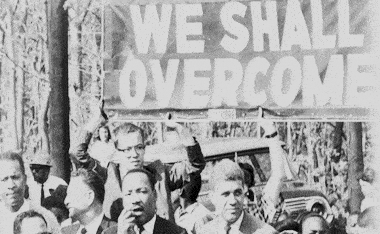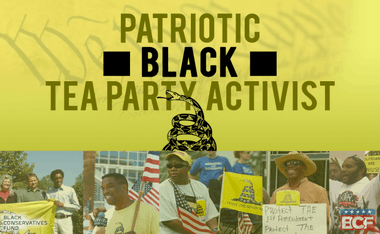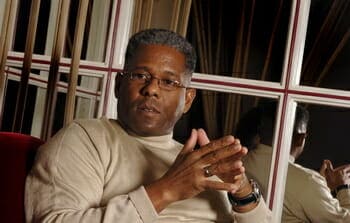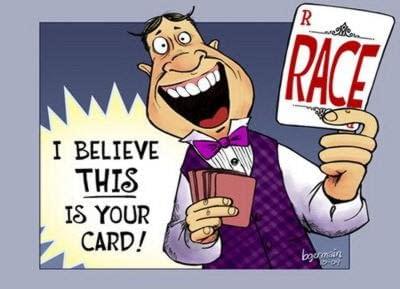If you listen closely, Dr. Williams refuses to use the term “African American” in a simple discussion of the issues facing Americans:
In fact, in an old article, Dr. Williams spells out his thinking clearly… one post sums up Walter Williams main points well:
First it devalues the diversity within Africa – Africa is filled with nations and regions with diverse histories, peoples, ethnicities and leaders. Second, it perpetuates the whole trend that Americans and Europeans need to help them poor AFRICANS. So we devise buy a water bottle and feed a African child campaign – or consumeristic ploys that convince you to buy products to that .00000001% goes to some African AID/HIV fund where the marketing costs more than what is donated. Third – using the term African American is retarded b.c it takes away from the concept that Blacks ARE Americans – they are more American than anyone else who claims to be American because they built this country – they built up our profits, our surplus – they literally built Wall Street in NYC! They gave America culture – and all along dominant America stole their bodies, their labor, their minds and their rhythms – so this time around can we at least not try to steal their identities? If Blacks are telling us the term “african-American” doesn’t make sense -we should listen! Wouldn’t it sound retarded to call white Ameircans “European Americans”? It non-sensical to add a pre-fix to their “Americaness” because doing so takes away their Americaness. Fourth – Blacks whose ancestry date back to slavery are not from all over the African continent – mostly they were captured and sold from African’s gold coast – Western Africa fight – the label “African-American” is very inappropriate because many blacks trace their ancestory to the Carribeans – or to Brazil – or to Mexico.
While I am not a fan of Woodrow Wilson at all, he makes a great point in this WIKI article:
The term “hyphenated American” was published by 1889, and was common as a derogatory term by 1904. During World War I the issue arose of the primary political loyalty of ethnic groups with close ties to Europe, especially German Americans and also Irish Americans. Former President Theodore Roosevelt in speaking to the largely Irish Catholic Knights of Columbus at Carnegie Hall on Columbus Day 1915, asserted that,
There is no room in this country for hyphenated Americanism. When I refer to hyphenated Americans, I do not refer to naturalized Americans. Some of the very best Americans I have ever known were naturalized Americans, Americans born abroad. But a hyphenated American is not an American at all … The one absolutely certain way of bringing this nation to ruin, of preventing all possibility of its continuing to be a nation at all, would be to permit it to become a tangle of squabbling nationalities, an intricate knot of German-Americans, Irish-Americans, English-Americans, French-Americans, Scandinavian-Americans or Italian-Americans, each preserving its separate nationality, each at heart feeling more sympathy with Europeans of that nationality, than with the other citizens of the American Republic … There is no such thing as a hyphenated American who is a good American. The only man who is a good American is the man who is an American and nothing else.
President Woodrow Wilson regarded “hyphenated Americans” with suspicion, saying, “Any man who carries a hyphen about with him carries a dagger that he is ready to plunge into the vitals of this Republic whenever he gets ready.”
The modern Left is all about division. Separating people. And by separating [dividing], a culture is conquered:
….Most black families in the United States today have been here longer than most white families. No one except the American Indians can claim to have been on American soil longer. Why then call blacks in the United States “African-Americans” when not even their great-great-great-grandparents ever laid eyes on Africa?![]()
It is certainly understandable that activists, politicians and others who wish to divide Americans for their own purposes would push the notion of “African-Americans.” They also push such things as the “African” holiday Kwanzaa – which originated in Los Angeles – and “black English” or “ebonics,” which originated centuries ago in particular localities in Britain, and is wholly unknown in Africa.
It is certainly understandable that activists, politicians and others who wish to divide Americans for their own purposes would push the notion of “African-Americans.” They also push such things as the “African” holiday Kwanzaa – which originated in Los Angeles – and “black English” or “ebonics,” which originated centuries ago in particular localities in Britain, and is wholly unknown in Africa.
Names are just part of the process of creating wholesale frauds about the past in order to advance special agendas in the present. Personal names are also part of that fraud.
[….]
Of all the reactions against the supposed “slave names” among blacks, the most painfully ironic has been the taking of Arab names instead. The Arabs engaged in massive enslavement of Africans before the Europeans began to and continued long after the Europeans stopped.
One of the many reasons for studying history is to prevent history from being misused for current hidden agendas. Names are just one of the things being misused in this way.
What prompted this post was a fellow I know — J. Giordano — excerpting a bit from the following book by Theodore Roosevelt. I excerpt more of it here for those who love history:
- Theodore Roosevelt, Fear God and Take Your Own Part (New York, NY: George H. Doran, 1916), 17-28; the book is online for reading HERE.
But in addition to fearing God, it is necessary that we should be able and ready to take our own part. The man who cannot take his own part is a nuisance in the community, a source of weakness, an encouragement to wrongdoers and an added burden to the men who wish to do what is right. If he cannot take his own part, then somebody else has to take it for him; and this means that his weakness and cowardice and inefficiency place an added burden on some other man and make that other man’s strength by just so much of less avail to the community as a whole. No man can take the part of any one else unless he is able to take his own part. This is just as true of nations as of men. A nation that cannot take its own part is at times almost as fertile a source of mischief in the world at large as is a nation which does wrong to others, for its very existence puts a premium on such wrongdoing. Therefore, a nation must fit itself to defend its honor and interest against outside aggression; and this necessarily means that in a free democracy every man fit for citizenship must be trained so that he can do his full duty to the nation in war no less than in peace.
Unless we are thorough-going Americans and unless our patriotism is part of the very fiber of our being, we can neither serve God nor take our own part. Whatever may be the case in an infinitely remote future, at present no people can render any service to humanity unless as a people they feel an intense sense of national cohesion and solidarity. The man who loves other nations as much as he does his own, stands on a par with the man who loves other women as much as he does his own wife. The United States can accomplish little for mankind, save in so far as within its borders it develops an intense spirit of Americanism. A flabby cosmopolitanism, especially if it expresses itself through a flabby pacifism, is not only silly, but degrading. It represents national emasculation. The professors of every form of hyphenated Americanism are as truly the foes of this country as if they dwelled outside its borders and made active war against it. This is not a figure of speech, or a hyperbolic statement. The leaders of the hyphenated-American movement in this country (who during the last eighteen months have been the professional German-Americans and Austro-Americans) are also leaders in the movement against preparedness. I have before me a little pamphlet, circulated by a “German-American” organization, consisting of articles written by a German-American for a paper which claims to be the leading German paper in Illinois. This pamphlet is a bitter attack upon the policy of preparedness for the United States, and a slanderous assault on those advocating this American policy. It is, therefore, an effort in the interest of Germany to turn the United States into a larger Belgium—an easy prey for Germany whenever Germany desires to seize it. These professional German-Americans and Pro-Germans are Anti-American to the core. They play the part of traitors, pure and simple. Once it was true that this country could not endure half free and half slave. Today it is true that it can not endure half American and half foreign. The hyphen is incompatible with patriotism.
Patriotism should be an integral part of our every feeling at all times, for it is merely another name for those qualities of soul which make a man in peace or in war, by day or by night, think of his duty to his fellows, and of his duty to the nation through which their and his loftiest aspirations must find their fitting expression. After the Lusitania was sunk, Mr. Wilson stated in effect that such a time was not the right time to stir up patriotism. This statement is entirely incompatible with having a feeling of deep patriotism at any time. It might just as appropriately have been made by George Washington immediately after his defeat at the Brandywine, or by Abraham Lincoln immediately after the surrender of Fort Sumter; and if in either of these crises our leaders had acted on any such principle we would not now have any country at all. Patriotism is as much a duty in time of war as in time of peace, and it is most of all a duty in any and every great crisis. To commit folly or do evil, to act inconsiderately and hastily or wantonly and viciously, in the name of patriotism, represents not patriotism at all, but a use of the name to cloak an attack upon the thing. Such baseness or folly is wrong, at every time and on every occasion. But patriotism itself is not only in place on every occasion and at every time, but is peculiarly the feeling which should be stirred to its deepest depths at every serious crisis. The duty of a leader is to lead; and it is a dreadful thing that any man chosen to lead his fellow-countrymen should himself show, not merely so profound a lack of patriotism, but such misunderstanding of patriotism, as to be willing to say in a great crisis what President Wilson thus said at the time of the sinking of the Lusitania. This statement, coupled with his statement made about the same time as to being “too proud to fight,” furnishes the clue to the Administration’s policy both before and since. This policy made our great democratic commonwealth false to its duties and its ideals in a tremendous world crisis, at the very time when, if properly led, it could have rendered an inestimable service to all mankind, and could have placed itself on a higher pinnacle of worthy achievement than ever before.
Patriotism, so far from being incompatible with performance of duty to other nations, is an indispensable prerequisite to doing one’s duty toward other nations. Fear God; and take your own part! If this nation had feared God it would have stood up for the Belgians and Armenians; if it had been able and willing to take its own part there would have been no murderous assault on the Lusitania, no outrages on our men and women in Mexico. True patriotism carries with it not hostility to other nations but a quickened sense of responsible good-will towards other nations, a good-will of acts and not merely of words. I stand for a nationalism of duty, to oneself and to others; and, therefore, for a nationalism which is a means to internationalism. World peace must rest on the willingness of nations with courage, cool foresight, and readiness for self-sacrifice to defend the fabric of international law. No nation can help in securing an organized, peaceful and justice-doing world community until it is willing to run risks and make efforts in order to secure and maintain such a community.
The nation that in actual practice fears God is the nation which does not wrong its neighbors, which does so far as possible help its neighbors, and which never promises what it cannot or will not or ought not to perform. The professional pacifists in and out of office who at peace congresses pass silly resolutions which cannot be, and ought not to be, lived up to, and enter into silly treaties which ought not to be, and cannot be, kept, are not serving God, but Baal. They are not doing anything for anybody.[1] If in addition these people, when the concrete case arises, as in Belgium or Armenia, fear concretely to denounce and antagonize the wrongdoer, they become not merely passive, but active agents of the devil. The professional pacifists who applauded universal arbitration treaties and disarmament proposals prior to the war, since the war have held meetings and parades in this country on behalf of peace, and have gone on silly missions to Europe on behalf of peace—and the peace they sought to impose on heroes who were battling against infamy was a peace conceived in the interest of the authors of the infamy. They did not dare to say that they stood only for a peace that should right the wrongs of Belgium. They did not dare to denounce the war of aggression by Germany against Belgium. Their souls were too small, their timidity too great. They were even afraid to applaud the war waged by Belgium in its own defence. These pacifists have served morality, have shown that they feared God, exactly as the Pharisees did, when they made broad their philacteries and uttered long prayers in public, but did not lift a finger to lighten the load of the oppressed. When Mr. Wilson and Mr. Bryan made this nation shirk its duty towards Belgium, they made us false to all our high ideals; for they acted and caused this government to act in that spirit of commercial opportunism which refuses to do duty to others unless there is in it pecuniary profit for one‑self. This combination of mean timidity and mean commercial opportunism is peculiarly odious because those practising it have sought to hide it by profuse outbursts of wordy sentimentality and loud professions of attachment to impossible and undesirable ideals. One of the besetting sins of many of our public servants (and of not a few of our professional moralists, lay and clerical) is to cloak weakness or baseness of action behind insincere oratory on behalf of impractical ideals. The true servant of the people is the man who preaches realizable ideals; and who then practises what he has preached.
Moreover, even as regards the pacifists who genuinely desire that this nation should fear God, it is to be remembered that if the nation cannot take its own part, the fact that it fears God will be of no practical consequence to any one. Nobody cares whether or not the feeling of the Chinese people is against international wrongdoing; for, as China is helplessly unable to take her own part, she is in practise even more helpless to take the part of any one else and to secure justice and mercy for any one else. The pacifists who are seeking to Chinafy the United States are not only seeking to bring the United States to ruin, but are also seeking to render it absolutely impotent to help upright and well-behaved nations which are oppressed by the military power of unscrupulous neighbors of greater strength.
The professional pacifists, the leaders in the pacifist movement in the United States, do particular harm by giving well-meaning but uninformed people who do not think deeply what seems to them a convincing excuse for failure to show courage and resolution. Those who preach sloth and cowardice under the high-sounding name of “peace” give people a word with which to cloak, even to themselves, their failure to perform unpleasant duty. For a man to stand up for his own rights, or especially for the rights of somebody else, means that he must have virile qualities: courage, foresight, willingness to face risk and undergo effort. It is much easier to be timid and lazy. The average man does not like to face death and endure hardship and labor. He can be roused to do so if a leader of the right type, a Washington or Lincoln, appeals to the higher qualities, including the stern qualities, of his soul. But a leader, or at least a man who holds a leader’s place, earns praise and profit unworthily if he uses his gift of words to lull well-meaning men to sleep, if he assures them that it is their duty to do the easy and selfish thing, and furnishes them high-sounding phrases with which to cover ignoble failure to perform hard and disagreeable duties.
Peace is not the end. Righteousness is the end. When the Saviour saw the money-changers in the Temple he broke the peace by driving them out. At that moment peace could have been obtained readily enough by the simple process of keeping quiet in the presence of wrong. But instead of preserving peace at the expense of righteousness, the Saviour armed himself with a scourge of cords and drove the moneychangers from the Temple. Righteousness is the end, and peace a means to the end, and sometimes it is not peace, but war which is the proper means to achieve the end. Righteousness should breed valor and strength. When it does breed them, it is triumphant; and when triumphant, it necessarily brings peace. But peace does not necessarily bring righteousness.
As for neutrality, it is well to remember that it is never moral, and may be a particularly mean and hideous form of immorality. It is in itself merely unmoral ; that is, neither moral nor immoral ; and at times it may be wise and expedient. But it is never anything of which to be proud; and it may be something of which to be heartily ashamed. It is a wicked thing to be neutral between right and wrong. Impartiality does not mean neutrality. Impartial justice consists not in being neutral between right and wrong, but in finding out the right and uphold ing it, wherever found, against the wrong. Moreover, submission to an initial wrong means that all protests against subsequent and lesser wrongs are hypocritical and ineffective. Had we protested, in such fashion that our protest was effective, against what was done in Belgium by Germany, and against the sinking of the Lusitania by Germany, we could have (and in such case we ought to have) protested against all subsequent and minor infractions of international law and morals, including those which interfered with our commerce or with any other neutral rights. But failure to protest against the first and worst offences of the strongest wrongdoer made it contemptible, and an act of bad faith, to protest against subsequent and smaller misdeeds; and failure to act (not merely speak or write notes) when our women and children were murdered made protests against interference with American business profits both offensive and ludicrous.
The pacifists have used all kinds of arguments in favor of peaceful submission to, or refusal to prepare against, international violence and wrongdoing, and among others the very ancient arguments based upon the supposed teaching of the New Testament against war. In the first place, as I have already pointed out, this argument is quite incompatible with accepting the lesson taught by the action of the Saviour in driving the money-changers from the Temple; not to mention, incidentally, that the duty of preparedness has rarely been put in stronger form than by St. Luke in the direction that “He that hath no sword, let him sell his garment and buy one.”
[1] See the excellent little book called “Is War Diminishing?” by Woods and Baltzly. The authors deal, as they necessarily must if truthful deal, with the mischievous activities of those professional pacifists among whom Mr. Andrew Carnegie has attained an unhappy prominence: activities which in this country for the last five years have worked nothing but evil, and very serious evil, to our nation and to humanity at large, and to all genuine movements for the promotion of the peace of righteousness. The writers instance Mr. Nicholas Murray Butler as presenting in typical manner the shams and perversions of fact upon which the professional pacifists rely for their propaganda, and remark that these pacifists, “who pride themselves on having the superior moral point of view, openly disregard the truth,” and ask “these professors of ethics, law and justice, these presidents of colleges, these moral educators, if morality is not necessarily bound up with truth.” The pacifist movement in this country has not only been one of extreme folly and immorality, but has been bolstered by consistent and unwearied falsification of the fads, laudation of shallow and unprincipled demagogues, and condemnation of the upright public servants who fearlessly tell the truth.
